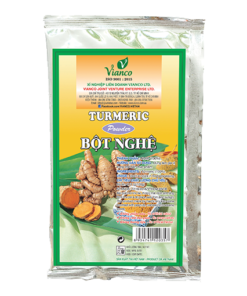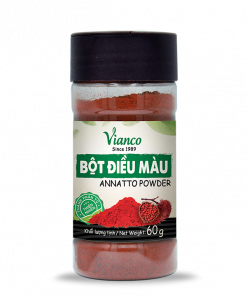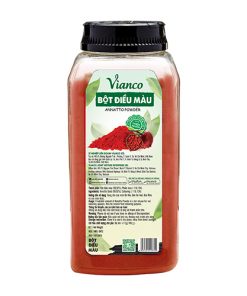No products in the cart.
Turmeric Powder
Weight: 50 grams and 500grams
Ingredient: natural turmeric
Usage: turmeric powder is used to spice up fried meat, stir-fry dishes, and an element of other dishes such as Lac Sa vermicelli, pancakes, and Barbecue.
Preservation: store the powder in a cool and dry place without the sunlight. Leftover or after-used products should be kept in a sealed jar. Draw attention to the expiration date before and when in use. Do not use it if the bag has been opened or torn.
Expiration date: 2 years
Turmeric or home turmeric, turmeric plant, Khuong Hoang (two-part name: Curcuma longa) is a perennial herbaceous plant in the ginger family, Zingiberaceae, with tubercle (rhizome) under the ground. It is native to tropical Tamil Nadu, south-eastern India, and needs temperatures from 20 degrees Celsius to 30 degrees Celsius (68 degrees Fahrenheit and 86 degrees Fahrenheit) and significant annual rainfall to thrive. The tree is harvested annually to get the tubercle and is bred from one part of the tuber in the following season. Turmeric is also known as Haldi, and turmeric has been used in South India for thousands of years and is a major ingredient in Siddha medicine. For the first time, it was used as a dye and then because of its medicinal value.

When not used immediately, the tuber is boiled for between 30 and 45 minutes and then dried in a heater. They are then crushed into a dark orange-yellow powder that is often used as a spice in Tamil cuisine and including curry types, or for coloring, coloring for the mustard spices. Its active ingredient is curcumin substance with a slightly spicy hot flavor, slightly bitter, smelling mustard, and ‘ bearing the flavor of the soil ‘ in a distinct way. Curcumin is the focus of attraction because of its potential healing features with a number of other diseases, including cancer, Alzheimer’s, diabetes, allergies, arthritis, and other chronic types of diseases. India is the country’s main producer of technology, with regional names depending on language and country.
Turmeric grows wild in the forests of South Asia and Southeast Asia. It is one of the main ingredients in many Asian dishes. Tamil Traditional medicine, also known as Siddha, has suggested the use of turmeric in food because of its potential healing value of It, which is still a subject is being researched. Its use for coloring does not have the primary value in South Asian cuisine.
Turmeric is mainly used in delicious dishes but is also used in some sweet dishes such as Sfouf cakes. In India, leaf turmeric is used to make a sweet dish especially paleo, by stacking rice flour together with a coconut mixture that not on the leaves, then wrapping then steaming in special autoclaves (GOA).
In recipes outside of South Asia, turmeric is sometimes used as a glowing yellow-colored substance like cakes. It is used in canned drinks and baked goods, dairy products, creams, yogurt, yellow pastries, orange juice, biscuits, the coloring of popcorn, candy, cream cakes, cereals, sauces, gelatin… This is an important ingredient in most commercial curry powders.
Most turmeric types are used in the form of tubercle, in some areas (especially in Maharashtra, Goa, Konkan and Kanara), the turmeric is used to wrap and cook food. The use of turmeric like this is usually in places where turmeric is planted there, as the leaves are used as soon as they harvest. The art leaf produces a distinctive flavor.
Although often used in dry powder form, turmeric is also used in fresh forms, such as Ginger. It has a wide variety of applications in Far Eastern recipes, such as pickles made from fresh turmeric containing soft turmeric blocks.
Turmeric is widely used as a spice in South Asian and Middle Eastern cuisines. Many Persian dishes use turmeric as a boot ingredient. Almost all fried dishes in Iran have oil, onions, and turmeric attached to any other ingredient that will be added.

In Nepal, turmeric is cultivated and is widely used in many vegetable and meat dishes because of its color as well as its potential value in traditional medicine. In South Africa, turmeric is used to make yellow rice.
In Vietnam, turmeric powder is used to create colors and adds to the flavor of certain dishes, such as pancakes, pancakes and Quang noodles. Turmeric powder is also used in many stir-fried dishes and soups in Vietnam.
In Indonesia, turmeric is used for Minangese curries or Padangese curries in Sumatra, such as Rendang, Sate Padang and many others.
In Thailand, fresh turmeric is widely used in many dishes, especially in southern Thai dishes, such as yellow curry (แกง เหลือง) and turmeric soup (ต้ม ขมิ้น).
In medieval Europe, turmeric has been called the Indian Saffron as it is widely used as a substitute for saffron, a much more costly type of spice.
Usage: turmeric powder is used to spice up fried meat, stir-fry dishes, and an element of other dishes such as Lac Sa vermicelli, pancakes, and Barbecue.
Preservation: store the powder in a cool and dry place without the sunlight. Leftover or after-used products should be kept in a sealed jar. Draw attention to the expiration date before and when in use. Do not use it if the bag has been opened or torn.
| Weight | 0.058 kg |
|---|---|
| Dimensions | 18 × 10 × 1 cm |
| Khối Lượng Tịnh | 50 Gram, 500 Gram |
Be the first to review “Turmeric Powder” Cancel reply
You must be logged in to post a review.


 Tiếng Việt
Tiếng Việt
















Reviews
There are no reviews yet.